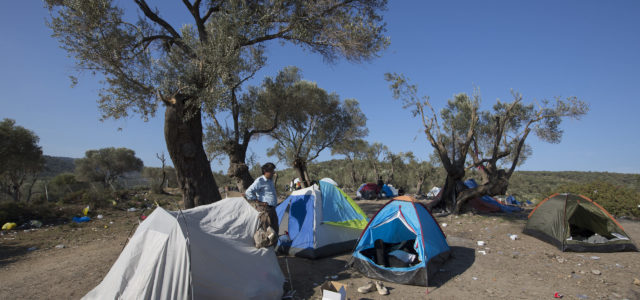Nasar Meer
In all the risk and uncertainty accompanying Covid-19, it is easy to forget safety is a relative concept. For the millions of displaced migrants and refugees, in official camps and informal settlements, the pandemic poses a terrifying threat that lays bare the inadequacy of current approaches to refugee settlement. The dangers are true the world over, from those internally displaced in Syria and Venezuela, to the recent swelling of Idlib province, Ciudad Juárez in Northern Mexico, the Zaatari camp in Jordan and Bekaa Valley in Lebanon, to name the most obvious.
Yet it is here, in Europe that an entirely avoidable catastrophe unfolds. Lacking the most basic sanitation, including soap and clean running water, thousands face a perilous fate, sleeping in close proximity in overcrowded camps that they are prevented from leaving.
On the Greek island of Lesvos, once a transit route for those crossing from Turkey, around twenty thousand people are squeezed into an unfit makeshift encampment, originally intended for no more than three thousand. The outcome? Roughly one water tap between thirteen hundred people and entire families made to occupy spaces of little more than more than three square metres. This means, as Médecins Sans Frontières’ (MSF) Medical Coordinator in Greece, Dr Hilde Vochten, makes plain, ‘recommended measures such as frequent hand washing and social distancing to prevent the spread of the virus are just impossible.’ It is for these reasons that MSF has called on the European Union to work in partnership with Greece to close the camps and resettle people before it is too late. From the residents of the Moira camp, meanwhile, we hear the increasingly desperate plea that if not all can be evacuated then priority be given to the elderly and vulnerable so at least they can be made safe.
The situation is no better on other Aegean islands of Chios, Samos, Leros, and Kos, where formal and informal camps have swelled since the EU-Turkey deal (signed in 2016) began operating to prevent onward movement from the camps. Indeed, while this Treaty was designed to prevent the movement of asylum seekers into Europe, what is less noted is how it was matched by a hardening in approach to those who had already arrived. Typical is the Pyli facility in Kos, an open structure to which thousands have been left to pin makeshift shelters with no organised water, sanitation or prospect of medical provision.
The call for urgent action does not need to rest on altruism and good will but law: 1951 Refugee Convention insists that asylum-seekers and refugees should not be penalised for having entered or stayed irregularly and, most pressingly in light of Covid-19, the UN High Commissioner for Refugees (UNHCR) has a clear protocol for identifying and addressing vulnerability of asylum seekers and refugees. This is more relevant than ever and must now be headed.
There are positive lessons we can draw on from elsewhere, including the recent decision of the Portuguese Government to treat asylum seekers and refugees in Portugal as permanent residents with access to health care, at least during the present crisis at least. Equally, we have seen in recent years how national level intransigence has been thrown into sharp relief by municipal, local or city level initiatives.
This has an older pedigree in the International Cities of Refuge Network, the Cities of Sanctuary, the Save Me campaign and the Eurocities network, each of which elevates the role of the local. Perhaps inverting the philosopher Giorgio Agamben’s discussion of a ‘State of Exception’, and so switching from how national level governments can respond to crises by diminishing rights, to how local level governments have responded to the migration crises by opening up, we might characterise one of the features in the responses as the rise of ‘Local States of Exception’.
Focusing on Germany, but in ways that has much broader implications, some observers highlight the ways in which city level ‘concern and support led to a novel form of activism around migrant rights: a sudden surge of non-traditional civic engagement that arose next to, and only partially out of, existing human rights, refugee, anti-racist and urban movements.’
In either case, and whatever else transpires in the coming weeks and months, what remains certain is that these camps are European constructions and all the responsibility for what befalls in them rests not with those who contract this illness, but in the failure of Greek and EU leaders to honour their obligations to the most vulnerable.
Nassar Meer is Professor of Race, Identity and Citizenship at the University of Edinburgh.
Image: Steve Evans
